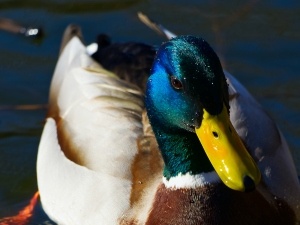
Odd behavior usually means that there is something up, this is true for humans, for your common domestic pets like cats and dogs, and it is also true for other pets like ducks.
This article explores why your duck is laying on its side.
Table of Contents
Why is my duck laying on its side?
Ducks try not to act sick, or injured, or anything out of the ordinary.
This is because they would otherwise be attacked by predators if they acted this way in the wild, so, they would rather pretend like there is nothing wrong.
However, these birds can’t pretend forever and will show signs of issues if they can’t mask the issues. Including something like laying on its side.
Here is why your duck may be laying on its side:
Humidity issues:
If the duck that you’re referring to is a recently hatched duckling then your bird may be laying on its side because its incubator settings were incorrect sometime, or throughout, the incubation process.
Incubator temperature and heat settings can affect your young bird’s health.
Incorrect settings can drown the bird, shrinkwrap the bird, kill the bird before it has the chance to hatch, or, like in your case, cause the bird to not be able to stand after hatching.
What to do:
You can try your best to keep this from happening in the future by making sure that your incubator humidity and temperature settings are kept correct and constant throughout the incubation.
Duck eggs need to be incubated in an environment where the humidity levels are between 45 and 55 percent, the temperature should be between 37.5 degrees Celsius, or, 99.5 degrees Fahrenheit.
Nutrient deficiency:
Another reason why your bird may be laying down may be that the bird may have a niacin deficiency.
Niacin is one of the vitamins needed for ducklings to grow strong and healthy bones. If your duckling can’t walk and is simply laying on its side then the bird may have a niacin deficiency.
If the bird is left untreated then the bird will turn bowl legged and will not want to do anything but lay down.
The bird may also become deformed, and, the bird’s legs may cause walking to become painful.
What to do:
Thankfully the bird can be treated and cured of this condition, the condition will not be permanent if you treat it early.
The bird would need to be given niacin supplements as treatment. These supplements would need to be given daily because the birds cannot store excess niacin in their body.
Foods that are high in niacin that you can give to your birds include brewer’s yeast and liquid B3 (Niacin).
Brewers yeast can be found online, at your local health store, and at natural food stores. The liquid B3 can also be found at health food stores and online.
You would need to add this niacin to your bird’s diet during the recovery stage, and, after the bird recovers to maintain the bird’s strong bones.
If you enjoyed this article then you may also be interested in other bird related articles. Here are some articles that you may be interested in: Chick Keeps Flipping On Back And Shaking, Chick Keeps Flipping On Back, Will A Single Chick Survive?, How To Make A Baby Chick Not Feel Lonely, Why Is One Chicken Always Alone, How To Get A Wild Duck To Trust You, Why Do Ducks Splash In The Water, Why Is My Female Duck Squeaking, Male Duck Making High-Pitched Noise


